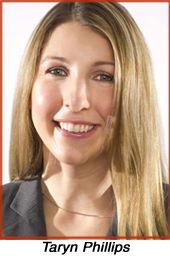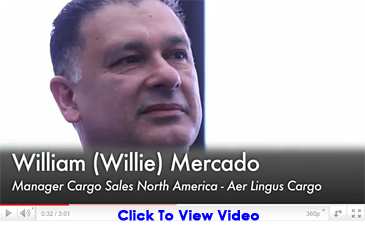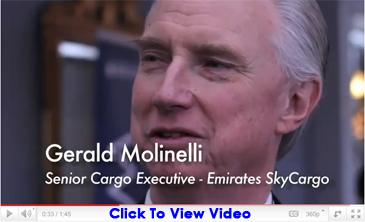Great
Expectations
Versus CNS Horizons
FlyingTypers carried an
interview in a 2009 article shortly after Michael Vorwerk was named
CNS president, in which Mr. Vorwerk listed his priorities at the time
as:
•
Cargo2000
•
Customer requirements – developing joint solutions
•
E-freight
In 2009, day one at CNS was a general
session and day two had a panel format with competing parallel sessions
scheduled—Time & Temperature Logistics for Healthcare Products
and Securing the Supply Chain (the same topic as one of the sessions
on Monday), while the other tracks were Breaking the Code of Air Cargo
Business, which focused on business intelligence and IATA DGR online
as paperless business.
Last year the program then returned to
a single track, first with e-freight and then with “getting more
of the forwarding and airline community to understand these initiatives
and improvements for air cargo.”
As the public business sessions for CNS
2011 in Phoenix, Arizona take off today, the Monday plenary session
format is unchanged as far as we can see.
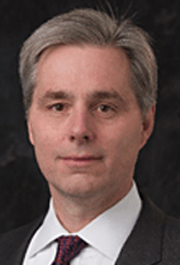  The
Monday plenary has two keynote speakers; the first in the morning is
Steve Gunning, (right) Managing Director Cargo at IAG, the holding company
of British Airways and Iberia. The
Monday plenary has two keynote speakers; the first in the morning is
Steve Gunning, (right) Managing Director Cargo at IAG, the holding company
of British Airways and Iberia.
Just before lunch the second speaker,
William Flynn, (left) President and CEO of Atlas Air, will be up.
Various industry participants are included
in the program; the forwarder perspective with Michael Schaecher, the
head of global airfreight at DHL, U.S. trade implications by a senior
equity analyst transportation services group at financial institution
BB&T.
After lunch comes global ocean freight,
a rare guest, Otto Schacht, Kuehne & Nagel’s global head of
ocean freight and Eugene Seroka, President The Americas for NOL.
The strategist, analyst and supply chain
principal of D.F. Hoppin & Associates will offer an industry outlook.
Probably the most anticipated session
is the last – Todd Owen, (below right) Executive Director Cargo
& Conveyance Security, U.S. Customs & Border Protection, who
also spoke at the CNS mini conference in Washington last February, will
be addressing concerns at that time.
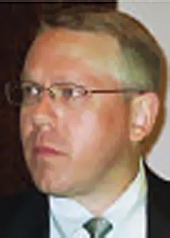 His presentation is titled “Air
Cargo Security after Yemen” and not only will his remarks be something
to look forward to, but also the questions and answers which are sure
to follow.
His presentation is titled “Air
Cargo Security after Yemen” and not only will his remarks be something
to look forward to, but also the questions and answers which are sure
to follow.
This continues to be a hot topic with
significant impact for the industry.
On Tuesday there are still parallel ‘specialty
tracks’ scheduled – New Technologies & Standards Impacting
the Air Cargo Industry and Markets Propelling Air Cargo, followed by
another - Competition Compliance in Airfreight and Future Developments
for Customs & Security.
The respective panels comprise a number
of experts in their fields, which will contribute to a lively discussion.
How well each track runs depends to a
certain extent on the moderator making the best of the talent and time
available.
The whole thing is over by noon and networking
can let loose in earnest until the reception and dinner or thereafter.
On the face of it, it’s a routine
agenda for this conference, with the majority of attendees taking time
out of their busy schedules to network, hold customer meetings and use
the framework of the event to simply be there and know who else is also
going to be there.
Each person attending has a different
rationale for the time and cost invested.
The bigger question about the role of
CNS is a fair question to ask, whether the particular audience attending
it actually expects it or not.
The entire program management is farmed
out to a third party, so it’s pretty much between IATA and the
contractors for their worldwide events.
What is CNS specific about this conference,
and how much so?
Truth be told, you can hear these topics
at any industry event and probably come across the same mix of people.
Yet CNS as a USA-specific entity seems
to have lost its soul and identity.
Maybe we are the only ones who mind?
Here are some ideas:
The recent FIATA/IATA spat following the
Istanbul World Cargo Symposium was centered on agent accreditation issues,
the training programs, and changes the forwarders have been demanding
for CASS, which IATA elected to ignore.
After all, in the U.S. CNS counts 95 airlines,
1,200 forwarders (with 2,500 branches) and 5 GSAs.
You would think these might be topics
of interest to the participants, but it seems there is no appetite,
much less courage to address the matters openly.
And in general, the only part of IATA
authorized to respond to the media these days is its corporate communications
department, not any of the respective section heads as domain experts.
Apparently the ongoing DOJ investigations
– in IATA’s view – are not a factor affecting CNS
attendance.
While CNS appears optimistic about GACAG,
the conference program doesn’t include anything on this subject.
There are a good number of sponsors, which
indicate the financial success of the conference is not in question.
The next couple of days will reveal more
about how things are going closer to the ground.
Ted/Flossie
|



